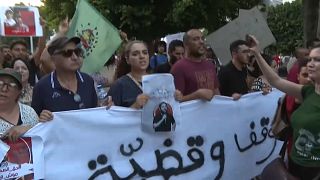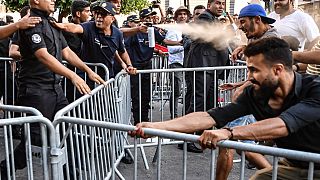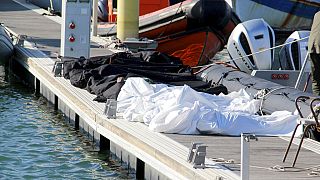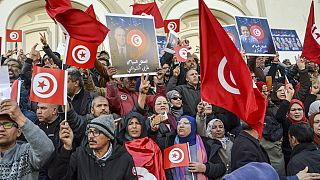Tunisia
Over 200 police officers rallied in Sfax, Tunisia's second city, to demand the release of eight arrested colleagues and defend their right to unionise.
Responding to a call from the National Union of Internal Security Forces (SNSI) Wednesday, the officers in plainclothes chanted pro-union slogans.
Over the summer, Tunisian President Kais Saied called for police unions to be consolidated into one organisation.
But the call was rejected by the SNSI and protesters set up 32 tents across the country.
On Friday, clashes broke out between unionised officers and the Sfax security forces during a demonstration.
"I say to all of you that the officials of the Interior Ministry are taking advantage of this case, the SNSI police union spokesperson starts.
"The Ministry is using its social networks to smear trade union work in security institutions.The most striking example is the image given to the public and international community of officers fighting each other. This is what the Ministry of the Interior wants to show regarding the trade union movement", Chokri Hamada adds.
A military court ordered that the eight soldiers be placed in detention. Their arrestation has been called slammed as "harassment" and a drive to stifle union rights.
According to Hamada, the officers were accused of "disturbing public security".
"It (the Interior Ministry) has brought affiliates (of SNSI police union) to justice as members of the security forces and not as union members. This is inadmissible and we cannot accept it", he insists.
Following the 2011 uprising that toppled former President Zine El Abidine Ben Ali, officiers had gained the right to establish their own trade unions.
The SNSI called it "hard-won" rights rejecting president Said's proposal of reform.












Go to video
UK police arrest three of migrants' deaths in Channel
01:05
Haiti: police recover cargo ship hijacked by gangs
00:59
British man running length of Africa nears finish line
01:31
Reaction: 4 sentenced to death for the assassination of Chokri Belaid in Tunisia
01:29
Kenya: Four people killed in blast near police station
01:55
Kenyans welcome suspension of police mission to Haiti after escalating violence